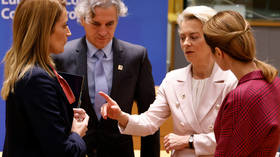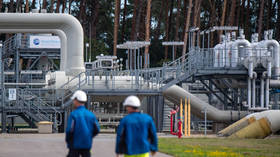EU fails to agree new anti-Russia sanctions – Reuters

EU member states have failed to agree a ninth package of economic sanctions targeting Russia over its military campaign against Ukraine, according to Reuters. The news agency, citing an anonymous diplomat, said several countries objected to a proposed change to the existing measures.
According to the report, discussions were held late on Wednesday in Brussels, ahead of the EU leaders’ summit on Thursday.
The main bone of contention, Reuters claims, were plans to allow the passage of Russian fertilizers through EU ports, including those produced by sanctioned Russian firms. Some countries reportedly argued that this would help ensure food security in developing nations.
Opponents, however, who according to Reuters included Poland and the three Baltic states, argued that such a relaxation would likely be abused by Russian oligarchs on the EU sanction list.
Other member states reportedly suggested giving the World Food Programme the right to authorise such exports.
Reuters' source told the agency that a new draft of the sanctions package was expected to be circulated on Thursday evening.
Last week, the Financial Times reported that Germany, France, Spain and the Netherlands had drafted a proposal calling for exemptions on Russian grain and fertilizers and that the current sanctions regime was delaying vital shipments to poorer regions.
The document reportedly states that the “current legal situation contributes to criticism that sanctions actually hinder trade in food and fertilizers.”
Back in September, Russian President Vladimir Putin called on the UN to pressure the EU to lift the restrictions. He said at the time that the sanctions first and foremost harmed developing countries.
The Russian head of state also pledged to provide 300,000 tons of fertilizers that had been held in EU ports to developing nations free of charge.
The EU imposed sanctions on Russian fertilizer exports back in April, banning the purchase, import or transfer of those products to the EU. In August, the European Commission issued a clarification, under which the regulations also applied to the transit of Russian fertilizers to third countries via the EU.













